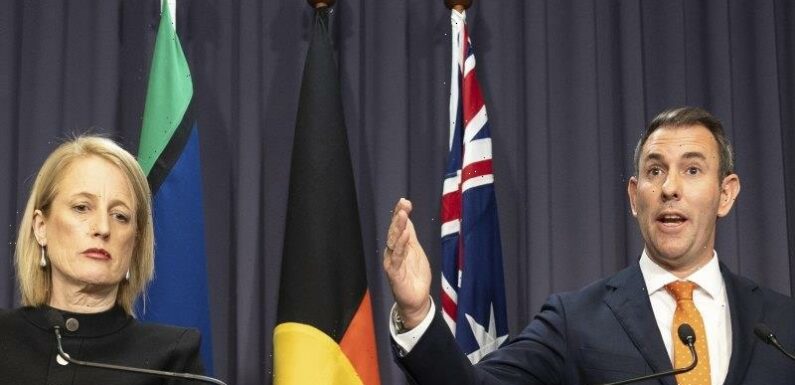
The country needs to have a discussion about how to fund government spending, the Treasurer said, as he revealed next month’s budget will be constrained to “bread and butter” spending to contain costs.
The budget deficit for the last financial year will be about $50 billion lower than originally forecast in March, but Jim Chalmers warned it was only a temporary improvement and there were unavoidable costs that Labor will have to deal with in its first budget.
“We’ve got some pretty extreme pressures on the budget … and there are more to come,” Chalmers said in Canberra on Tuesday.
Reserve Bank governor Philip Lowe last week told a parliamentary committee that Labor will need to either hike taxes, cut spending or undertake structural reform to meet community expectations for funding services.
Chalmers said he welcomed Lowe’s comments as the government has five growing areas of spending – health, National Disability Insurance Scheme, aged care, defence and interest rate bills on government debt – which are creating concerns.
“I do think we need to have a national discussion about the structural position of the budget and how we fund the expectations that Australians legitimately have,” he said.
“All of those costs are growing fast, and that’s a combination of the unavoidable and the desirable.”
In a preview of the final budget outcome, Chalmers said the budget deficit for 2021-2022 is forecast to be less than half of what was predicted in the March budget, thanks in part to high commodity prices. But the boost will not last as the two-week average price of iron ore and metallurgical coal has already dropped by 20 and 25 per cent respectively since June.
Delays in spending also account for the rosier deficit – now expected to be about $30 billion, instead of $78 billion – but Finance Minister Katy Gallagher said a lot of that improvement must now come out of subsequent budgets.
Other spending promised by the previous government that will have to come out of future budgets will include nearly $3 billion in the delayed procurement of personal protective equipment and vaccines, the nearly $1.5 billion that health and disability services need just this year, $2 billion in flood-related costs and delays in road and rail transport spending.
“There’s a range of other programs right across the public service where they were funded for the short term, but they are ongoing programs,” Gallagher said.
Chalmers said the current government will remain on the hook for a “large chunk” of those projects and programs in its upcoming budget.
The task of sifting out unwanted spending in the government’s “waste and rorts” audit will also take longer than expected.
“We want to be convinced that the spending is quality, it’s going where it’s needed, it meets those tests. Where there is the opportunity to reprioritise, we’re looking at that.”
Some of that work will come out in the October budget, Gallagher said.
Shadow treasurer Angus Taylor said the announcement from Chalmers and Gallagher showed they inherited a good budget from the Coalition, but Labor should not spend the extra money.
“There’s a great windfall, both on the revenue side and in reduced spending,” he said.
“[The Treasurer] needs to be clear with the Australian people and say, yes, he has inherited a very strong economy, a very strong budget. And his job now is to improve on that.”
That slowing of commodity prices could dampen economic growth in the final few months of the year, Commonwealth Bank chief economist Gareth Aird said. The bank’s economists expect economic growth to slow to 2.3 per cent in the three months to December, as household consumption falls.
Cut through the noise of federal politics with news, views and expert analysis from Jacqueline Maley. Subscribers can sign up to our weekly Inside Politics newsletter here.
Most Viewed in Politics
From our partners
Source: Read Full Article